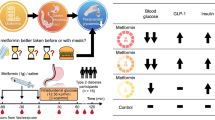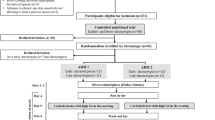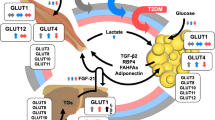Abstract
The orexigenic and anabolic gastric hormone ghrelin is secreted in response to acute and chronic energy requirements. While pre-prandial increases and post-prandial decreases of plasma ghrelin levels in rodents and humans seem to indicate a role for the novel peptide hormone as an afferent meal initiator or “hunger hormone”, the precise mechanisms which are suppressing ghrelin secretion in response to caloric intake remain largely unknown. We show here that human ghrelin levels decrease by almost 50% under hyperinsulinemic euglycemic clamp conditions (no.=4, p=0.001), revealing physiologically relevant increases of insulin levels as an independent determinant of circulating ghrelin levels. In a second study, 3–4-fold increased plasma free fatty acid levels, as another metabolic candidate for the modulation of circulating ghrelin concentrations, were generated by constant lipid infusion, but failed to change plasma ghrelin. Simultaneous elevation of free fatty acids and insulin again markedly decreased ghrelin concentration (no.=4, p=0.01). Insulin induced suppression of circulating ghrelin levels (or the lack thereof) could be a mechanism with relevance for the understanding of the (patho-) physiology of meal initiation and termination, the pathogenesis of the metabolic syndrome and for the development of respective therapeutic perspectives.
Similar content being viewed by others
References
Kojima M., Hosoda H., Date Y., Nakazato M., Matsuo H., Kangawa K. Ghrelin is a growth-hormone-releasing acylated peptide from stomach. Nature 1999, 402: 656–660.
Date Y., Kojima M., Hosoda H. et al. Ghrelin, a novel growth hormone-releasing acylated peptide, is synthesized in a distinct endocrine cell type in the gastrointestinal tracts of rats and humans. Endocrinology 2000, 141: 4255–4261.
Tschöp M., Smiley D.L., Heiman M.L. Ghrelin induces adiposity in rodents. Nature 2000, 407: 908–913.
Wren A.M., Seal L.J., Cohen M.A. et al. Ghrelin enhances appetite and increases food intake in humans. J. Clin. Endocrinol. Metab. 2001, 86: 5992.
Cummings D.E., Purnell J.Q., Frayo R.S., Schmidova K., Wisse B.E., Weigle D.S.A. preprandial rise in plasma ghrelin levels suggests a role in meal initiation in humans. Diabetes 2001, 50: 1714–1719.
Tschöp M., Wawarta R., Riepl R.L. et al. Post-prandial decrease of circulating human ghrelin levels. J. Endocrinol. Invest. 2001, 24: RC19–RC21.
Shiiya T., Nakazato M., Mizuta M. et al. Plasma ghrelin levels in lean and obese humans and the effect of glucose on ghrelin secretion. J. Clin. Endocrinol. Metab. 2002, 87: 240–244.
Caixas A., Bashore C., Nash W., Pi-Sunyer F., Laferrere B. Insulin, unlike food intake, does not suppress ghrelin in human subjects. J. Clin. Endocrinol. Metab. 2002, 87: 1902–1906.
Townsend R.R., Zhao H. Differential effect of insulin on saturated and unsaturated fatty acids. Metabolism 2002, 51: 779–782.
Expert Committee on the Diagnosis and Classification of Diabetes Mellitus. Report of the Expert Committee on the Diagnosis and Classification of Diabetes Mellitus. Diabetes Care 2000, 23: S4–S19.
Obici S., Feng Z., Karkanias G., Baskin D.G., Rossetti L. Decreasing hypothalamic insulin receptors causes hyperphagia and insulin resistance in rats. Nat. Neurosci. 2002, 5: 566–572.
Broglio F., Benso A., Gottero C. et al. Effects of glucose, free fatty acids or arginine load on the GH-releasing activity of ghrelin in humans. Clin. Endocrinol. 2002, 57: 265–271.
Beck B., Musse N., Stricker-Krongrad A. Ghrelin, macronutrient intake and dietary preferences in long-evans rats. Biochem. Biophys. Res. Commun. 2002, 292: 1031–1035.
English P.J., Ghatei M.A., Malik I.A., Bloom S.R., Wilding J.P. Food fails to suppress ghrelin levels in obese humans. J. Clin. Endocrinol. Metab. 2002, 87: 2984.
Author information
Authors and Affiliations
Corresponding author
Rights and permissions
About this article
Cite this article
Möhlig, M., Spranger, J., Otto, B. et al. Euglycemic hyperinsulinemia, but not lipid infusion, decreases circulating ghrelin levels in humans. J Endocrinol Invest 25, RC36–RC38 (2002). https://doi.org/10.1007/BF03344062
Accepted:
Published:
Issue Date:
DOI: https://doi.org/10.1007/BF03344062




